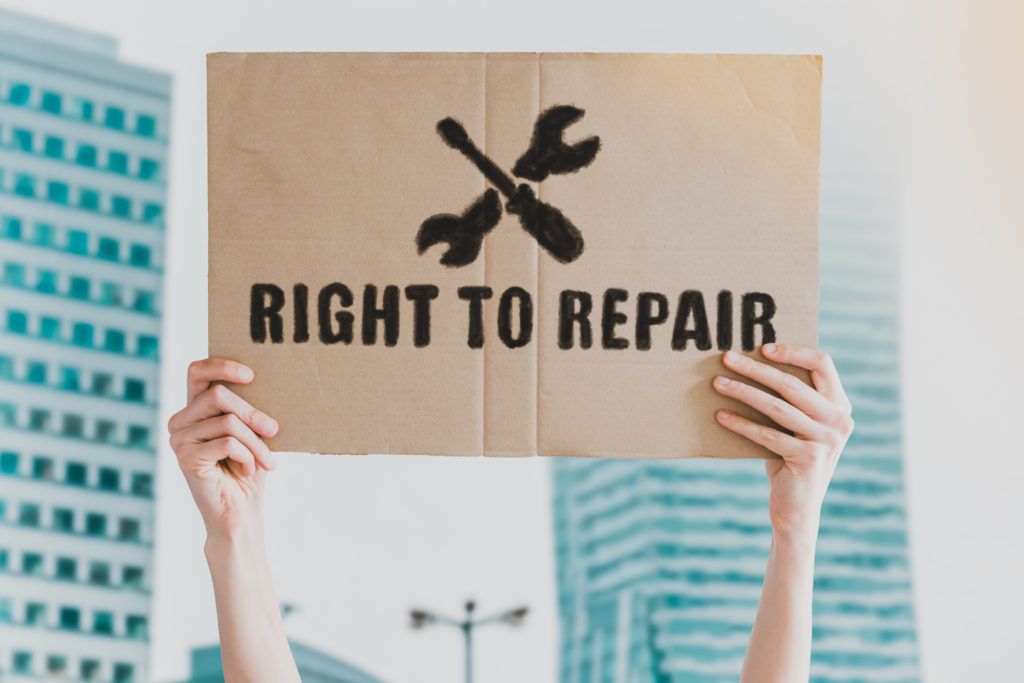The Vermont Public Interest Research Group hailed the introduction of two bills (H.79 and H.81) last week that, if enacted, would establish a right-to-repair in Vermont.
Both bills were introduced with a long, trans-partisan list of co-sponsors, demonstrating the broad support for this commonsense reform.
Right-to-repair, sometimes called fair repair, seeks to address the growing problem of costly, time-consuming repair monopolies by requiring manufacturers to provide consumers access to the parts, tools and information necessary to fix the products they own or have them fixed by a local, independent repair business.
“It used to be that most products were easily repairable with parts that were widely available. But more and more, companies are putting up barriers—legal, physical, digital—that prevent consumers from fixing the products they own.” explained Zach Tomanelli, consumer protection advocate for VPIRG. “From cell phones and computers to tractors and wheelchairs—manufacturers have, in many cases, made it impossible to repair these items without going through the manufacturer themselves, often in an effort to increase their bottom line.”
The Vermont Fair Repair Act (H.79) applies to a wide range of consumer products requiring the original equipment manufacturers to make available—on fair and reasonable terms—the parts, tools, manuals, and diagnostic materials needed to fix those products.
Rep. Katherine Sims (D – Albany, Craftsbury, Glover, Greensboro)—who introduced the bill and its companion with Rep. Anne Donahue (R – Northfield, Berlin)—said that the diverse array of legislators co-sponsoring the legislation showed fair repair was an idea that almost anyone can get behind.
“If you’ve had a phone, computer, or even a basic household appliance like a coffee pot break recently, you know how difficult it can sometimes be to get the parts and information you need to fix it.” Sims said. “This legislation is about giving Vermonters options. If something we own breaks, we should have the opportunity to fix it, or bring it to a local repair shop and know that they can get the parts and information they need to repair it.”
The other bill – H.81 – establishes a specific right-to-repair for agricultural equipment.
Unfair repair practices are a particular problem for farmers. More and more modern farm equipment runs on software. This new technology—while beneficial in many ways—means that manufacturers can lock down the repair process, forcing farmers to rely exclusively on manufacturer-branded technicians to fix their equipment.
In rural areas, the wait for an authorized tech can be days or sometimes weeks—delays that can be incredibly costly to farmers who deal with finite windows of time for planting and harvesting.
The introduction of these bills adds to the rapidly growing momentum the fair repair movement has seen in recent years.
Nationally, the Federal Trade Commission has, under the Biden Administration, started cracking down on anti-repair practices, pursuing action against Harley-Davidson, Westinghouse and Weber grills in 2022.
Meanwhile states have moved forward with their own protections. Colorado’s first-in-the-nation right-to-repair law for powered wheelchairs went into effect on January 1. While New York recently became the first state to enact a right-to-repair law covering electronic products.
National fair repair advocates added their praise for Vermont’s proposed legislation Friday.
“These bills are necessary to make sure that manufacturers do their part to help us keep the things we like in use and out of the landfill,” said Gay Gordon-Byrne, the executive director of the Repair Association. “Our schools, businesses, government offices and industries will have the same parts and tools to fix their equipment as consumers. Our rural residents will be restored the opportunity to fix their own equipment or hire a person they trust to help them.”
For its part, VPIRG vowed to marshal its membership in support of this legislation.
“Right-to-repair is sensible public interest policy with broad support. I think the fact that the co-sponsors of these bills include Democrats, Republicans, Progressives and Independents shows that,” Tomanelli said. “VPIRG is going to do whatever it takes to make sure Vermonters can repair the products they own.”
“Vermont has the opportunity to be at the forefront of a movement that has a simple and uncontroversial demand: Let us fix our stuff!”

